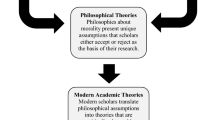Abstract
Professional Ethics, viewed as a managerial challenge and opportunity in this study, deals with the often overlooked conceptions, actions and behavior of individuals who see themselves both as members of a profession and as members of an organization. Managers have to deal with this dual loyalty and inherent potential for conflict. This is of particular importance for new types of organizations when wanting to develop and sustain an ethical platform for the ultimate goal – assuring that future business decisions of individuals are in "ethical balance" with the organization's own values and goals.
Similar content being viewed by others
References
Allison, R.: 1993, Global Disasters.Inquiries into Management Ethics (Simon and Schuster (Asia), Singapore).
Bartlett, C.: 1981, ‘The Management of Headquarter Subsidiary Relationships in Multinational Corporations’, in P. Buckley (ed.), The Internationalisation of the Firm (Academic Press, London), pp. 244–260.
Brady, N.: 1990, Ethical Managing.Rules and Results (MacMillan, New York)
Callahan, Joan C. (ed.): 1988, Ethical Issues in Professional Life (University Press, New York, Oxford).
Carr, A. Z.: 1968, ‘Is Business Bluffing Ethical?’, Harvard Business Review 46, 143–148.
Davis, M.: 1988, ‘The Special Role of Professionals in Business Ethics’, Business and Professional Ethics Journal 7(2), 51–62.
Denhardt, K.: 1988, The Ethics of Public Service: Resolving Moral Dilemmas in Public Organizations (Greenwood Press, New York).
Ferrel, O. C. and L. G. Gresham: 1985, ‘A Contingency Framework for Understanding Ethical Decision Making in Marketing’, Journal of Marketing 49 (Summer), 87–96.
Hoivik, H.von Weltzien: 1996 ‘A Joint Stakeholder Learning Process in Participatory Environmental Ethics: a Case Study’, International Journal of Value-Based Management 10 (1997), 147–172.
Hoivik, H.von Weltzien: 2000, ‘Accessing, Managing and Sustaining Moral Values in Organizations: A Case Study’, Paper presented at ISBEE Congress, July 2000.
Jackson, T.: 1993, ‘Ethics and the Art of Intuitive Management’, European Management Journal, EAP 20th Anniversary, 57–67.
Kahn, W. A.: 1990, ‘Toward an Agenda for Business Ethics Research’, Academy of Management Review 15(2), 311–328.
Kanter, R.: 1977, Men and Women of the Corporation (Basic Books, New York).
Kelly, G. A.: 1955, The Psychology of Personal Constructs (Norton, New York).
Martin, J. and C. Siehl: 1983, ‘Organisational Culture and Counter Culture: An Uneasy Symbiosis’, Organisational Dynamics 12(2), 52–64.
Nonaka, I. and H. Takeuchi: 1995, The Knowledge Creating Company (Oxford University Press, Oxford).
Paine, L. Sharp: 1997, Leadership, Ethics and Organizational Integrity (Irwin, Chicago).
Pennings, J. M.: 1970, ‘Work-Value Systems of White Collar Workers’, Administrative Science Quarterly 15, 69–79.
Prahalad, C. K. and G. Hamel: 1990, ‘The Core Competence of the Corporation’, Harvard Business Review (May-June), 79–91.
Sen, A.: 1987, On Ethics and Economic (Basil Blackwell, Oxford).
Senger, J.: 1971, ‘Managers Perceptions of Subordinates' Competency as a Function of Personal Value Orientations’, Academy of Management Journal 14, 415–423.
Sinclair, A.: 1993, ‘Approaches to Organisational Culture and Ethics’, Journal of Business Ethics 12, 63–73.
Van Maanen, J. and S. Barley: 1984, ‘Occupational Communities: Culture Control in Organizations’, 10 Heidi von Weltzien Hoivik in B. Shaw (ed.), Research in Organizational Behaviour, Vol. 6 (JAI Press, Greenwich).
Van Maanen, J. and S. Barley: 1985, ‘Cultural Organization: Fragments of a Theory’, in P. Frost et al. (eds.), Organizational Culture (Sage, Beverly Hills, California), pp. 31–54.
Victor, B. and J. B. Cullen: 1988 ‘The Organisational Bases of Ethical Work Climates’, Administrative Science Quarterly 33, 101–125.
Vitell, S. J. et al.: 1993, ‘The Effects of Culture on Ethical Decision-making: An Application of Hofstede's Topology’, Journal of Business Ethics(October), 753–760.
Wahn, J.: 1993, ‘Organizational Dependence and the Likelihood of Complying with Organizational Pressures to Behave Unethically’, Journal of Business Ethics 12, 245–251.
Author information
Authors and Affiliations
Rights and permissions
About this article
Cite this article
von Weltzien Hoivik, H. Professional Ethics – a Managerial Opportunity in Emerging Organizations. Journal of Business Ethics 39, 3–11 (2002). https://doi.org/10.1023/A:1016363429915
Issue Date:
DOI: https://doi.org/10.1023/A:1016363429915




